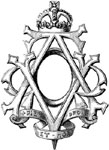
The Third Last Word
REVERT'S ROSTRUM
Thirteenth-century French King (and saint) Louis IX was passionate about crusading. The monarch spent six years of his life on the Seventh Crusade in an attempt to counter the greatest threat to the survival of the crusader states in the Levant: Ayyubid Egypt. Louis’s carefully planned campaign enjoyed some initial success when the army captured Damietta, a strategically valuable city. But the impetuousness of his brother Robert I of Artois occasioned a crippling defeat and Louis’s capture by the Egyptians. After paying a costly ransom, the indefatigable Louis remained in the Holy Land another four years, drawing from his own purse to fortify the cities of the Kingdom of Jerusalem.
Even after Louis returned to Europe to govern his native realm, he could not shake the crusading urge. Persuaded by erroneous intelligence that North African caliph Muhammad I al-Mustansir was willing to convert to Christianity, Louis set his sights on Tunis. The expedition was a disaster: Not only was the caliph uninterested in Christianity, but the African heat, coupled with a lack of sanitation and fresh provisions, doomed the crusaders. The Franks succumbed in large numbers to what was probably dysentery. Among the fatalities was Louis’s son John Tristan. Louis himself was stricken a few weeks after his son, and he received Last Rites shortly before his death. Louis’s last words were alleged to be, “Jerusalem, Jerusalem!”
Given his crusading obsession, one might be surprised to learn that Louis IX devoted incredible energy to the maintenance and flourishing of the French kingdom, as well as to ensuring the welfare and success of his 11 children. Louis penned the Enseignements, or “Teachings,” to his eldest son, Philip III, who accompanied the saintly king on that final, fateful crusade and then succeeded him. “The first thing I advise is that you fix your whole heart upon God, and love Him with all your strength, for without this no one can be saved or be of any worth,” Louis wrote to Philip. “Do not oppress your people and do not burden them with tolls or tailles, except under very great necessity…. Keep yourself free from foolish expenses and evil exactions, and that your money should be well expended and well acquired.”
You May Also Enjoy
Christ's final word is not a cry of desperation or defeat but a “victory cry,” a uniting of His will with God, pregnant with eager expectation of everlasting joy.
Eve, though derived from Adam, completes him. She is his body, “bone of my bones and flesh of my flesh.” Eve provides Adam his masculine self-identification.
Can the God who condemns the killing of the innocent be the same God who orders the innocent to be killed? How could God command such an action?

